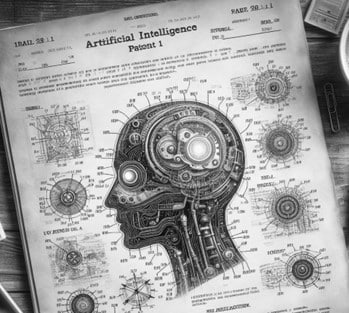
This article provides context around the intense interest in intellectual property in the AI or machine learning field and considers what attorneys should look for when they need to retain an expert in this field. We previously considered the algorithm and software landscape for expert witnesses; here we look at the specifics of AI cases.
AI patenting land-grab runs the gamut from multinationals to startups
That there is a ferocious patent land-grab in progress in the AI field can be easily demonstrated by checking the AI Cases Bot from the Free Law Project. Its frequency of posting on X is remarkable!
Industry heavyweights such as Microsoft¹, IBM², and Stability AI³ are actively involved in IP litigation around artificial intelligence.
In Robert Plotkin’s book AI Armor, he identifies several reasons why even startups are increasing their focus on acquiring patents. These include:
- Raising funds – investors find a strong set of patent applications reassuring.
- Attracting acquiring parties.
- Obtaining licensing revenue.
- Improving the company’s ability to attract and retain top-quality talent.
- Deterrence of litigation from NPEs or competitors.
[1] Microsoft Corp. v. Parallel Networks, LLC, No. 6:20-cv-00344 (W.D. Tex. 2020) [2] IBM v. Expedia Group, Inc., No. 2:22-cv-00115 (E.D. Tex. 2022) [3] Getty Images (US), Inc. v. Stability AI, Inc., No. 1:23-cv-00135 (D. Del. 2023)
Selecting an expert witness for an AI patent case
With both patent prosecutions and litigation in the area increasing at a brisk clip, it’s worth looking at factors a lawyer should consider when selecting an expert witness for an artificial intelligence case.
The expert should have deep knowledge and experience in the specific AI technologies and applications relevant to the case. This may include machine learning, natural language processing, computer vision, or other AI subfields. Advanced degrees, research experience, and industry work in these areas will make the witness credible at deposition and trial.
Also, prior experience serving as an expert witness in patent litigation cases bolsters the value of the expert’s testimony. Familiarity with the legal process, courtroom testimony, and experience working with attorneys means that a retaining attorney will need to spend less time interacting with the expert on procedural topics.
Communication skills are critical in any kind of expert witnessing since a primary goal is to assist the finder of fact in coming to a clear understanding of the issues. The expert must be able to clearly explain complex AI concepts and technologies to a non-technical audience of judges and juries. The attorney should evaluate their ability to break down complicated ideas, use analogies, and provide clear and concise answers to questions. Teaching experience, especially at the university level can be relevant here.
Credibility and reputation in the field are crucial since the field is “on fire” and many experts seek this kind of work. The lawyer should look for individuals with a track record of patent filings, publications, conference presentations, and industry recognition.
A key skill the attorney should screen for is an ability to provide unbiased and objective opinions based on their expertise and the facts of the case. The expert should be willing to consider alternative viewpoints and provide balanced testimony that can withstand cross-examination.
Finally, the expert’s availability is critical. The retaining attorney should probe other commitments the expert has during the case’s expected lifetime. What factors will limit the speed at which the expert can respond to the vagaries of litigation? Most seasoned litigators will agree that IP cases are frequently time-consuming and demanding. A top performing expert has the availability and flexibility to dedicate sufficient time to the case, review materials, and collaborate with the legal team with excellent responsiveness.
Conclusion
The recent flood of AI-related litigation has increased the need for expert witnesses to guide the finders of fact. Incisive questions are useful to ensure that retained experts will excel writing reports, at deposition and at trial.
Leave a Reply